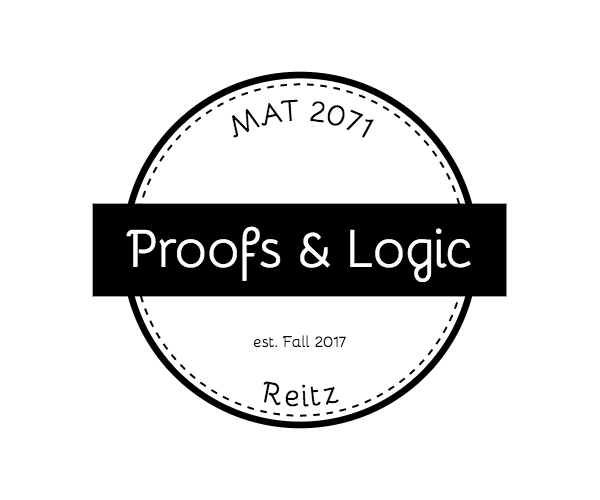Week 2 Assignments
Written work – Sec 1.8 p.28: 3, 5, 6, 8, Due Tuesday, September 12th, at the start of class.
NOTE: On this assignment, odd problems are worth 3 points, even problems worth 5 points.
WeBWorK – Assignment #2, due Tuesday, September 12th, at midnight.
OpenLab – OpenLab #2, due Thursday, September 14th, at the start of class.
Handy Links
 Logic on Math StackExchange
Logic on Math StackExchange
- Hilbert system: Proof of several theorems December 30, 2024I was asked to prove the following: $$\vdash_L\ \neg q\to(p\to p)$$ $$\vdash_L\ p\to(q\to (\neg q\to q))$$ Additionally, assuming hypothetical syllogism($p\to q,q\to r\vdash_L p\to r$) and $(\neg p\to p)\to p$, show that $\vdash_L\ p\to \neg\neg p$. The axioms provided are: $$p\to(q\to p)$$ $$p\to(q\to r)\to((p\to q)\to(p\to r)$$ $$(\neg p\to \neg q)\to(q\to p)$$ I believe only substitution and […]Noah Tang
- Proof about a consistent calculus producing falsehoods [closed] December 29, 2024We take the Hilbert calculus H with the additional axiom: $\neg \exists x \forall y: y \notin x$. This calculus is consistent, since Hilbert is consistent, and the additional assumption should not cause any issues (we'll just assume that for now). Thus, it holds that $H, \neg \exists x \forall y: y \notin x \vdash […]God
- Building an Unsatisfiable Set Over Fixed Atoms with All Pairs Satisfiable December 29, 2024Problem Statement Consider a set of propositional formulas $M$ with the following properties: $M$ contains exactly 3 formulas All formulas in $M$ use the same set of atomic propositions The formulas in $M$ cannot all be true simultaneously (i.e., $M$ is unsatisfiable) Any subset of $M$ containing exactly 2 formulas is satisfiable Find such a […]Guillermo Vázquez
- Are the $\Pi_1$ functions a strict intermediary between $\Delta_1$ and $\Delta_2$? December 28, 2024This question has to do with categorizing arithmetically definable functions. A total function $f:\mathbb{N}\to\mathbb{N}$ is said to be $\Pi_1$ precisely when there exists a $\Pi_1$ formula $\phi(x,y)$ such that $f(x)=y \iff \phi(x,y)$, with similar definitions for $\Delta_1$ and $\Delta_2$ functions. Due to Post's theorem, a total function is $\Sigma_n$ if and only if it's $\Delta_n$, […]Jade Vanadium
- Can I determine if two formulas are the same using truth tables when both have different variables? [closed] December 28, 2024I know that i can check if two formulas are the same using truth tables when both formulas have the same variables. My doubt is if I can determine , for example , if these formulas are the same: A AND B A AND B AND (C OR NOT C ) The example above is […]Nicolas Pacheco
- Transfinite induction and consistency statements December 28, 2024I'm interested in learning more about precise what transfinite induction results are equivalent to various consistency statements in arithmetic. Focusing on induction up to $\epsilon_0$, I see an interesting couple of results in Arai's book Ordinal Analysis and an Introduction to Proof Theory (pp. 99-100... would appreciate it if anyone has another reference for these) […]spaceisdarkgreen
- Can the "three laws of thought" be used as alternative axioms of the sentential calculus? December 28, 2024I'm reading a little book on formal systems. After introducing truth tables, the book formulates the sentential calculus as a formal axiomatic theory in which the symbols are $\rightarrow$,$\neg$, $($, $)$, and the sentential letters $A_1, A_2, \dots $. The well formed formulas (wff) are defined recursively, and the Axiom schemes are: $$L1: \ (A\rightarrow(B\rightarrow […]ErrorPropagator
- Is $\vdash_{GL} \square H \Rightarrow \vdash_{GL} H$ wrong in the modal provability logic GL? December 27, 2024I am currently reading about Gödel's second incompleteness theorem in Rautenberg's Einführung in die Mathematische Logik (see A Concise Introduction to Mathematical Logic p. 289 for an English version of the book) and he introduces a modal provability logic $G$ (I assume it is the same as $GL$, but they restrict the semantics to only […]Marvin Bergmann
- truth value of a conditional involving propositional functions as antecedent and consequent [duplicate] December 27, 2024Assume we have three propositional functions based on the real-valued variable x: A(x) := x > 0 B(x) := x > -2 C(x) := x > 3 And I construct the conditional statements S1, S2 from the predicates A, B, C as: S1(x) := A ---> B S2(x) := A ---> C We know that […]Fat32
- Induction proof of a logic expression defined by recurrence relation [closed] December 24, 2024I'm posting this message to possibly find a proof by induction for this: I'm calculating a logical expression defined by a recurrence relation. I'm calculating boolean values $X_{k+1}$, where $X_{k+1}$ could be $True$ (noted $T$) or $False$ (noted $F$) but as i do the calculus symbolically you will almost never see $T$ or $F$ in […]Damien Mattei




Leave a Reply